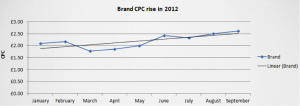PPC is the easiest way to reach the top of the search engine rankings. All you need to do is purchase the ad which goes through a bidding system. Yes, of course there are some other variable like the quality score, how many competitors are playing in the same arena and so on.
Generally speaking, this concept should be clear as crystalline water, but not all companies may be accustomed to this concept.
As click costs rise, many companies who are already investing in pay per click marketing campaigns are looking toward hiring a search engine optimization company to increase their exposure and reduce their advertising spend.
Something that can be seen also from the interesting graph below, generated via the new unified Trends and Insight for Search Google released in the occasion of Google’s 14th birthday.
 A situation well likely generated by online marketers frustrated by click fraud and increasing click costs.
A situation well likely generated by online marketers frustrated by click fraud and increasing click costs.
What these companies often ignores how PPC costs could be much higher if, for instance, the content creation cost would partially allocated also to PPC and not only to search engine optimization (SEO). In fact, when properly managed, great content also empowers the paid search campaigns (Another great reason for shutting PPC down).
So what’s the reason why PPC is still part of the marketing mix?
SEO and PPC – a potent Combo
Taking advantage of both PPC and SEO comes with great results as both discipline complements each other and can boost efficacy of one another as well.
As Google calculates the CPC on certain SEO factors, optimizing a site can drive a pay per click campaign’s success up (e.g. content optimization). From a reverse standpoint, while organic listings often get more attention than pay per click ads on a search engine results page, having both can help you reach good real estate for the terms you want to rank for and this could increase your online exposure, traffic, and success.
An open conversation that may end up in different avenues, in accordance of what portion of the PPC campaign we are talking about: branded terms, generic, product match etc. If branded terms are the ones threatened for the shut down, the immediate consideration it should be made is about the cost and the conversion rate of your campaign, that will become almost immediately less converting as normally branded terms are the best converting.
However, if a company wishes to pull out PPC from the mix, the following immediate risks should be considered:
Two-way communication is important. Immediate loss of traffic even on terms where SEO ranks first due to the fact that double first page prime real estate pretty much universally provides an overall CTR boost.
If the landscape is competitive and the competition is coming immediately after with company brand in top position likely winning the auction more on quality score than bid size, when the company remove themselves from the landscape competitors will notice immediately and suddenly will receive cheaper positioning and better CPA’s on these keywords. This mean for competitors a chance to step up their aggressiveness (if they react quickly and have a good agency) and for the brand a return to a more competitive landscape
Two-way communication is important
Receiving and providing feedback hence optimising the PPC campaign is important. Questions like how the paid search performing against organic?, or are sales and profit growing? Should be part of the client/agency relationships process.
Whilst working with clients, it is important ensuring the agency to not make PPC ad
vertising more complex than what is required, coming up with performance analysis to demonstrate the profitability of investing in the channel. Providing something like the following, it is a great starting point:
- Conversion rate for PPC keywords broken down by brand and generic. Competitor’s terms may be included as well, but it is unlikely having an SEO campaign optimized for those terms.
- CPA broken down in a similar fashion as above;
- Conversion rate via SEO delivery vs. Paid (assuming the goals for SEO can overlap the ones for PPC)
- Current SEO traffic vs. Paid Search traffic on brand and generic terms
- CTR – Although more complicate for SEO due to the “not provided gap”, it may be possible pick up a keyword data set, look at the impressions for each keyword and the clicks against each for SEO and Paid search so to work out a sort of “True CTR”.
In conclusion…
Although I appreciate the importance of the right mix, the truth is that corporate marketers are so worried about protecting their jobs that they throw their money into programs whose ROI can be easily calculated. Sadly PPC offers this level of granularity, SEO does not.
Luckily, there are also smarter marketers that at a certain point in time will trial PPC cost reduction too. Although this may not necessarily represent a good idea, agencies - which clearly are interested in profit - should show themselves as open as possible to every testing theory but also being as honest as possible to demonstrate what the reality is without beefing up numbers to save their margins.


